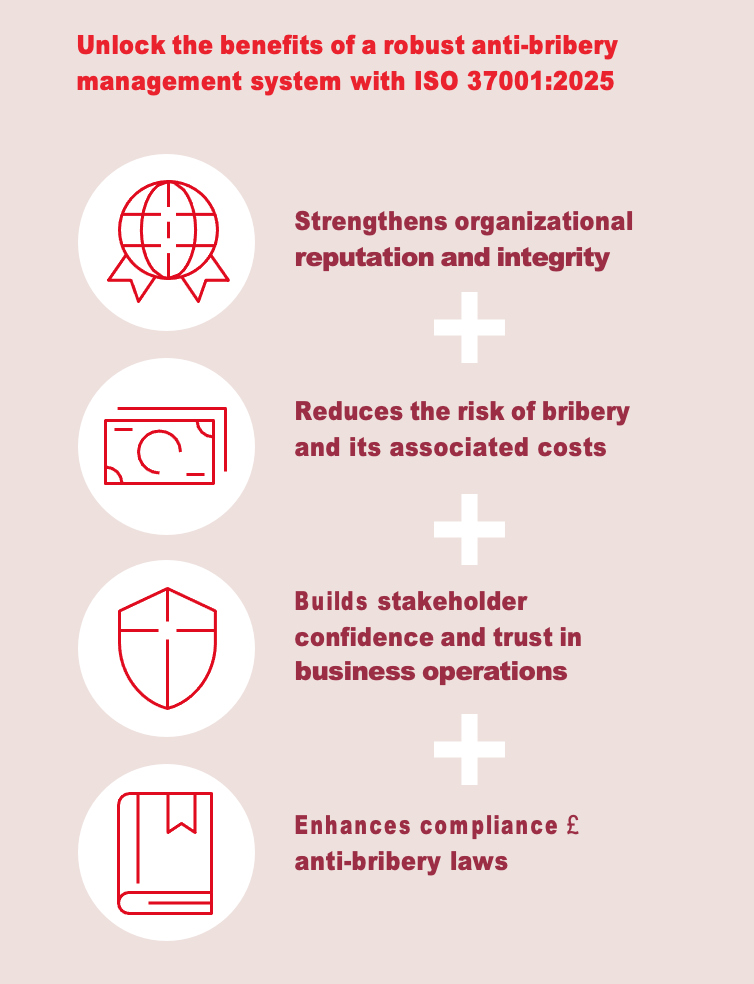Anti-bribery management systems
Fostering a culture of integrity
Bribery remains one of the most destructive and complex issues facing organizations and governments worldwide. Despite relentless efforts to combat it, bribery continues to undermine political stability, increase business costs, and contribute to poverty. The latest edition of ISO 37001 provides updated guidelines and requirements to help organizations strengthen their anti-bribery measures and foster a culture of integrity.
What is an anti-bribery management system?
An anti-bribery management system is designed to help organizations embed an anti-bribery culture within their operations, while implementing appropriate controls. This proactive approach enhances bribery detection and prevents incidents before they occur.
ISO 37001:2025, Anti-bribery management systems – Requirements with guidance for use, offers requirements and guidance for establishing, implementing, maintaining and improving an anti-bribery management system. It can function as a stand-alone or be seamlessly integrated into an organization’s existing management framework.
The standard addresses bribery in the public, private and not-for-profit sectors, including acts committed by or against an organization or its staff, and bribes offered or accepted through or by third parties. Bribery can happen anywhere, involve any amount and encompass both financial or non-financial advantages or benefits.
Why choose ISO 37001:2025?
Strengthening organizational integrity and anti-bribery culture
Strengthening organizational integrity and anti-bribery culture
ISO 37001:2025 emphasizes the importance of cultivating a culture of integrity and ethical behaviour across the organization. It empowers leadership to actively champion anti-bribery values, creating a transparent and accountable environment that protects the organization’s reputation and builds stakeholder trust.
Reducing reputational and legal risks and costs
A robust compliance policy, supported by effective management systems, helps organizations meet legal obligations and uphold their commitment to integrity. By implementing an anti-bribery policy back by a strong management system, organizations can proactively protect themselves – reducing costs, mitigating risks and safeguarding their reputation against the damaging effects of bribery.
Enhancing stakeholder confidence through global compliance
By adopting ISO 37001, organizations demonstrate their alignment with the latest globally harmonized management system best practices.
This not only ensures compliance with international anti-bribery regulations, but streamlines integration with other key standards like ISO 9001 (quality management) and ISO 37301 (compliance management), driving operational efficiency and earning stakeholder trust.
Empowering leadership to act ethically and responsibly
ISO 37001 puts leadership at the forefront of the fight against bribery.
By fostering a culture of integrity and providing clear, actionable guidance, the standard equips every part of the organization to act ethically and responsibly, safeguard operations and drive sustainable growth.

What other standards can help with compliance?
ISO 37301:2021, Compliance management systems – Requirements with guidance for use, is essential for organizations looking to meet legal, regulatory and ethical standards in their operations. It helps mitigate risks, promote a culture of integrity and strengthen organizational governance and reputation.
ISO 37002:2021, Whistleblowing management systems – Guidelines, provides guidance for establishing, implementing and maintaining an effective whistleblowing management system based on principles of trust, impartiality and protection. It empowers organizations to foster a safe and transparent environment where concerns can be raised with confidence.
ISO 37009, Conflicts of interest – Guidelines, provides guidance for managing conflict of interest (COI) in organizations, including definitions, principles, and procedures to identify, manage and resolve conflict of interests.
What about certification?
Third parties can certify an organization’s compliance with ISO 37001 just as they do for other ISO standards such as ISO 9001.
While certification doesn’t guarantee the complete eradication of bribery in your organization, it can help you implement robust and proportionate measures that substantially reduce bribery risks and effectively manage any incidents that arise.

About ISO
ISO (International Organization for Standardization) is an independent, non-governmental international organization with a membership of 173* national standards bodies. Through its members, it brings together experts to share knowledge and develop voluntary, consensus-based, market-relevant International Standards that support innovation and provide solutions to global challenges.
ISO has published more than 25 700* International Standards and related documents covering almost every industry, from technology to food safety, to agriculture and healthcare.
For more information, please visit www.iso.org.
*January 2025



